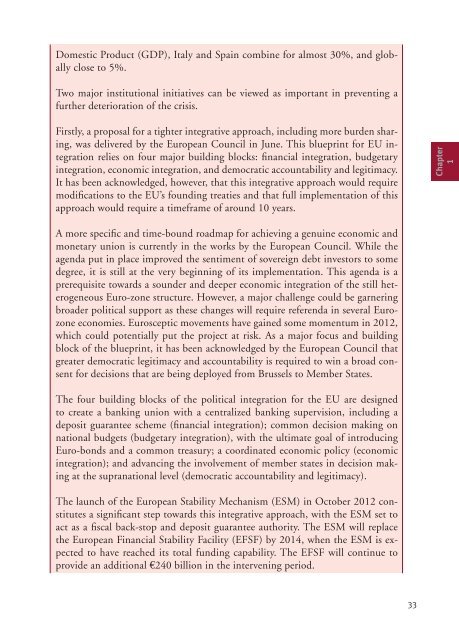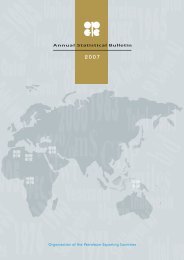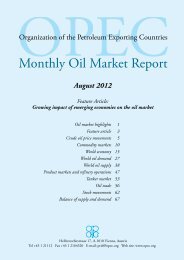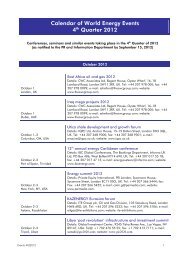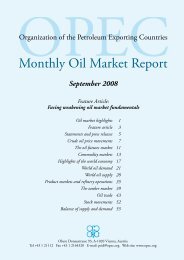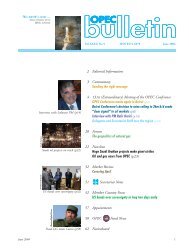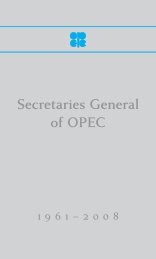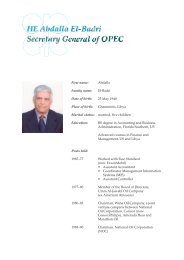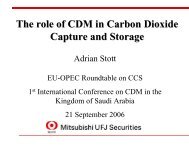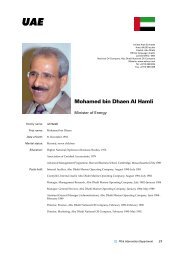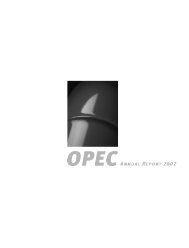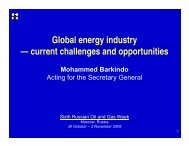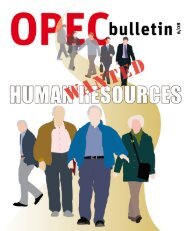World Oil Outlook - Opec
World Oil Outlook - Opec
World Oil Outlook - Opec
- TAGS
- world
- outlook
- opec
- www.opec.org
Create successful ePaper yourself
Turn your PDF publications into a flip-book with our unique Google optimized e-Paper software.
Domestic Product (GDP), Italy and Spain combine for almost 30%, and globally<br />
close to 5%.<br />
Two major institutional initiatives can be viewed as important in preventing a<br />
further deterioration of the crisis.<br />
Firstly, a proposal for a tighter integrative approach, including more burden sharing,<br />
was delivered by the European Council in June. This blueprint for EU integration<br />
relies on four major building blocks: financial integration, budgetary<br />
integration, economic integration, and democratic accountability and legitimacy.<br />
It has been acknowledged, however, that this integrative approach would require<br />
modifications to the EU’s founding treaties and that full implementation of this<br />
approach would require a timeframe of around 10 years.<br />
A more specific and time-bound roadmap for achieving a genuine economic and<br />
monetary union is currently in the works by the European Council. While the<br />
agenda put in place improved the sentiment of sovereign debt investors to some<br />
degree, it is still at the very beginning of its implementation. This agenda is a<br />
prerequisite towards a sounder and deeper economic integration of the still heterogeneous<br />
Euro-zone structure. However, a major challenge could be garnering<br />
broader political support as these changes will require referenda in several Eurozone<br />
economies. Eurosceptic movements have gained some momentum in 2012,<br />
which could potentially put the project at risk. As a major focus and building<br />
block of the blueprint, it has been acknowledged by the European Council that<br />
greater democratic legitimacy and accountability is required to win a broad consent<br />
for decisions that are being deployed from Brussels to Member States.<br />
The four building blocks of the political integration for the EU are designed<br />
to create a banking union with a centralized banking supervision, including a<br />
deposit guarantee scheme (financial integration); common decision making on<br />
national budgets (budgetary integration), with the ultimate goal of introducing<br />
Euro-bonds and a common treasury; a coordinated economic policy (economic<br />
integration); and advancing the involvement of member states in decision making<br />
at the supranational level (democratic accountability and legitimacy).<br />
The launch of the European Stability Mechanism (ESM) in October 2012 constitutes<br />
a significant step towards this integrative approach, with the ESM set to<br />
act as a fiscal back-stop and deposit guarantee authority. The ESM will replace<br />
the European Financial Stability Facility (EFSF) by 2014, when the ESM is expected<br />
to have reached its total funding capability. The EFSF will continue to<br />
provide an additional €240 billion in the intervening period.<br />
33<br />
Chapter<br />
1


